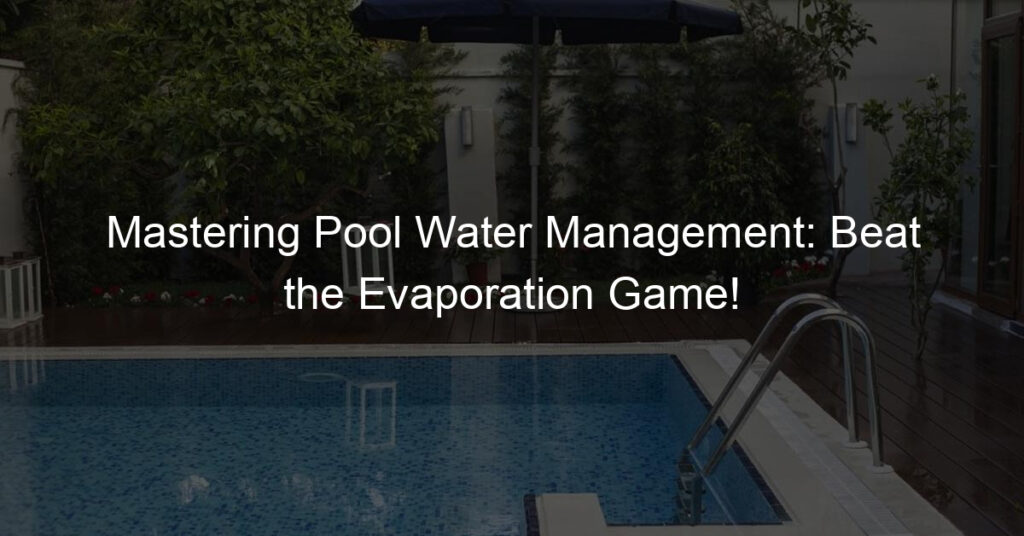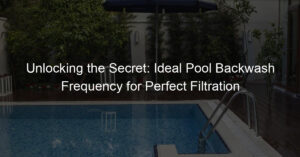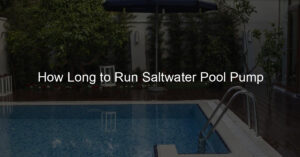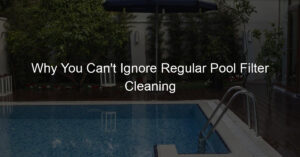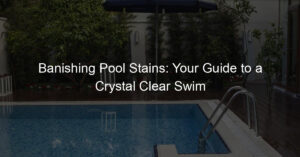Introduction to Pool Water Management
Pool water management is a crucial aspect of maintaining a healthy and enjoyable swimming environment. It involves a variety of tasks, from balancing chemicals to managing water evaporation. In this article, we will delve into the importance of pool water management and understand the concept of pool water evaporation.
- Importance of Pool Water Management
- Understanding Pool Water Evaporation
Managing your pool water is not just about keeping it clean and clear. It’s about ensuring the health and safety of those who use the pool. Unbalanced water can lead to a variety of problems, including skin and eye irritation, the growth of harmful bacteria, and damage to pool equipment. Moreover, proper management can also help in conserving water by reducing unnecessary wastage.
Water evaporation is a natural process that occurs when water turns into vapor and escapes into the air. This process can be accelerated by factors such as high temperatures, wind, and low humidity. In pools, evaporation can lead to significant water loss if not properly managed. It’s estimated that a typical pool can lose up to a quarter of its water each month due to evaporation alone. Understanding this process is the first step towards effective pool water management.
In the following sections, we will explore strategies for managing pool evaporation and conserving water, backed by case studies and examples. By the end, you will be well-equipped to master the pool water evaporation game.
Understanding Pool Water Conservation
Pool water conservation is a crucial aspect of maintaining a swimming pool. It involves a set of practices aimed at reducing water wastage and promoting efficient water use. By understanding the key principles of pool water conservation, you can ensure your pool is not only enjoyable but also environmentally friendly.
Key Principles of Pool Water Conservation
There are two main principles of pool water conservation: reducing pool water evaporation and effective swimming pool water management. Let’s delve into these principles:
- Reducing Pool Water Evaporation
- Effective Swimming Pool Water Management
Evaporation is the primary cause of water loss in swimming pools. It occurs when water turns into vapor and escapes into the air. Factors such as temperature, humidity, wind, and pool usage can increase the rate of evaporation. By implementing strategies such as using pool covers, maintaining the right water temperature, and reducing wind exposure, you can significantly cut down on evaporation and conserve pool water.
Effective water management involves regular monitoring and maintenance of your pool. This includes checking for leaks, maintaining the correct chemical balance, and ensuring the pool’s filtration system is working efficiently. Regular maintenance not only conserves water but also extends the lifespan of your pool and enhances the swimming experience.
Understanding and implementing these principles can make a significant difference in your water conservation efforts. Remember, every drop of water saved contributes to a sustainable and healthier environment.
Benefits of Pool Water Conservation
When we talk about pool water conservation, we often think about the amount of water we can save. But the benefits go beyond just saving water. Let’s dive into the two main benefits of pool water conservation: cost savings and environmental impact.
- Cost Savings
One of the most immediate benefits of pool water conservation is the cost savings. Water isn’t free, and neither is the energy used to heat and filter it. When you conserve pool water, you’re also saving on these costs.
Let’s take an example. According to the U.S. Environmental Protection Agency, a typical swimming pool can lose about 1,000 gallons of water per month due to evaporation. If we consider the average cost of water in the U.S., which is $1.50 for 1,000 gallons, you could be saving $18 per year just by reducing evaporation. And this doesn’t even include the savings on energy costs for heating and filtering the water!
- Environmental Impact
Pool water conservation also has a significant environmental impact. Water is a precious resource, and conserving it helps to preserve our environment. By reducing the amount of water your pool uses, you’re also reducing the amount of water that needs to be treated and pumped to your home. This not only saves water but also reduces energy use and greenhouse gas emissions.
Moreover, pool water often contains chemicals like chlorine that can be harmful to the environment if they end up in our rivers and oceans. By conserving pool water, we can also reduce the amount of these chemicals that are released into the environment.
In conclusion, pool water conservation is not just about saving water. It’s about saving money and protecting our environment. So the next time you’re enjoying a swim, remember the benefits of pool water conservation and do your part to conserve this precious resource.
Managing Pool Evaporation
One of the primary challenges of maintaining a swimming pool is managing evaporation. Water naturally evaporates, but when it happens excessively in your pool, it can lead to several issues. Let’s delve into how to identify signs of excessive evaporation.
Identifying Signs of Excessive Evaporation
Excessive pool evaporation can be tricky to identify. However, there are two clear signs that can help you determine if your pool is losing water at a faster rate than normal.
- Regular need for water replacement: If you find yourself frequently refilling your pool, it might be due to excessive evaporation. Normally, pools only need to be topped off once or twice a month. If you’re doing it more often, it’s a sign that your pool is losing water too quickly.
- Increased water bills: Another sign of excessive evaporation is a sudden spike in your water bills. If your water usage hasn’t changed significantly but your bills have increased, it could be due to your pool losing water and needing constant refills.
Recognizing these signs early can help you manage pool evaporation effectively. In the next section, we will discuss some solutions to control pool water evaporation.
Pool Water Evaporation Solutions
Now that we understand the signs of excessive pool water evaporation, let’s explore some effective solutions to manage this issue. There are two primary methods that can significantly reduce the rate of evaporation from your pool.
- Use of Pool Covers
- Regulating Pool Temperature
One of the most effective ways to reduce pool water evaporation is by using pool covers. A pool cover acts like a barrier between the pool water and the air, reducing the amount of water that can evaporate. It’s like putting a lid on a pot of boiling water!
There are various types of pool covers available in the market, such as solar covers, thermal covers, and automatic covers. Solar covers are designed to absorb sunlight and transfer the heat to the pool water, helping to keep the water warm and reducing evaporation. Thermal covers, on the other hand, are designed to retain the heat in the pool water, especially during the cooler months. Automatic covers can be easily rolled out and retracted with the push of a button, providing convenience and ease of use.
Another effective way to manage pool water evaporation is by regulating the pool temperature. The warmer the pool water, the faster it will evaporate. Therefore, keeping the pool water at a moderate temperature can help reduce evaporation.
It’s important to note that the ideal pool temperature can vary depending on personal preference and the type of activity in the pool. However, a good rule of thumb is to keep the pool temperature between 78 to 82 degrees Fahrenheit for recreational swimming. For energy efficiency and water conservation, it’s recommended to lower the pool temperature when the pool is not in use.
By implementing these solutions, you can effectively manage pool water evaporation, conserve water, and save on your water bills. Remember, every drop counts!
Reducing Pool Water Evaporation
Water evaporation is a common challenge for pool owners. However, with the right strategies, you can significantly reduce the amount of water your pool loses to evaporation. Let’s explore some practical steps you can take to control pool water evaporation.
Practical Steps to Control Pool Water Evaporation
There are two main strategies you can employ to control pool water evaporation: regular pool maintenance and effective use of pool chemicals. Let’s delve into each of these.
- Regular Pool Maintenance
- Effective Use of Pool Chemicals
Maintaining your pool on a regular basis is crucial in controlling water evaporation. This includes tasks such as cleaning the pool, checking for leaks, and ensuring the pool cover is in good condition. A well-maintained pool not only reduces water loss but also extends the lifespan of your pool equipment.
Pool chemicals play a significant role in reducing water evaporation. For instance, a pool cover alone can reduce evaporation by up to 95%. However, when combined with a pool chemical like a liquid solar blanket, you can further minimize water loss. This chemical forms a thin, invisible layer on the pool’s surface, reducing evaporation. Remember, it’s essential to use these chemicals as directed by the manufacturer to ensure safety and effectiveness.
By implementing these practical steps, you can significantly reduce pool water evaporation, saving both water and money. Remember, every drop counts when it comes to water conservation.
Swimming Pool Water Evaporation Tips
Managing pool water evaporation is a crucial aspect of pool maintenance. Here are a couple of tips that can help you reduce the amount of water your pool loses due to evaporation.
- Minimize Water Features
- Use Windbreaks
Water features such as fountains and waterfalls can significantly increase the rate of evaporation. While these features can enhance the aesthetic appeal of your pool, they also expose more water to the air, leading to faster evaporation. By minimizing the use of these features, you can effectively reduce water loss.
Wind can accelerate the evaporation process. By using windbreaks such as fences, hedges, or screens around your pool, you can lessen the impact of wind on your pool water. Not only will this help in reducing evaporation, but it can also provide additional privacy and aesthetic appeal to your pool area.
Remember, every drop of water saved is a step towards more efficient pool water management. By implementing these tips, you can enjoy your pool while also conserving water.
Pool Water Evaporation Prevention
Water evaporation is a common issue faced by pool owners. It not only leads to water waste but also increases the cost of pool maintenance. However, there are several advanced techniques available to prevent pool water evaporation.
Advanced Techniques for Pool Water Maintenance
Let’s dive into some of the most effective methods to prevent pool water evaporation. These techniques are not only efficient but also easy to implement.
-
Use of Liquid Pool Covers
Liquid pool covers are a modern and innovative way to prevent pool water evaporation. They are invisible barriers that reduce evaporation by up to 50%. These covers are safe, easy to use, and compatible with most pool systems. You simply pour the liquid into your pool, and it spreads across the surface to form a thin layer. This layer reduces heat loss and water evaporation.
-
Installing a Pool Enclosure
Pool enclosures are another effective way to prevent water evaporation. They cover the entire pool area, protecting it from wind and sun, which are the main causes of evaporation. Pool enclosures can be permanent or retractable, allowing you to enjoy your pool in all weather conditions. They also offer additional benefits such as keeping out debris, reducing maintenance time, and providing safety for children and pets.
Both techniques are excellent options for preventing pool water evaporation. The choice between them depends on your specific needs, budget, and pool setup. Remember, every drop of water saved is a step towards a more sustainable and cost-effective pool maintenance strategy.
Save Water in Swimming Pool: Case Studies
Let’s dive into some real-life examples of how residential and commercial pools have successfully saved water. These case studies will provide you with practical insights and strategies to implement in your own pool.
Case Study 1: Residential Pool
In this case study, we will explore a residential pool owner who faced significant challenges in conserving water and the steps they took to overcome these issues.
- Challenges faced: The homeowner was losing a substantial amount of water due to evaporation and splash-out. The pool was also frequently refilled due to the high usage by family and friends, leading to excessive water consumption.
- Solutions implemented: The homeowner decided to take action to reduce water waste. They installed a pool cover to minimize evaporation and controlled the pool’s usage during peak evaporation times, such as midday when the sun is at its hottest. They also implemented regular pool maintenance to ensure the pool’s systems were running efficiently and not contributing to unnecessary water loss.
- Results achieved: After implementing these changes, the homeowner saw a significant reduction in water usage. Their water bill decreased by 30%, and they also noticed that the pool water remained cleaner for longer periods, reducing the need for frequent refilling and chemical treatments. This case study demonstrates that with a few strategic changes, it’s possible to save water and money while still enjoying your pool.
Case Study 2: Commercial Pool
Let’s dive into our second case study, which focuses on a commercial pool. Commercial pools are typically larger and have more users, which can present unique challenges in water management and conservation.
- Challenges faced
- Solutions implemented
- Results achieved
The main challenge faced by the commercial pool in this case study was excessive water evaporation. This was due to the large surface area of the pool and the high temperatures in the region. The pool was losing thousands of gallons of water each week, leading to high water bills and a significant waste of resources.
To combat the issue of water evaporation, the pool management decided to implement a combination of strategies. First, they installed a pool cover to reduce evaporation when the pool was not in use. Secondly, they adjusted the pool’s temperature settings, as warmer water evaporates more quickly. Lastly, they invested in a water recycling system to reuse the water that was cleaned from the pool.
The results of these changes were impressive. The pool’s water usage was reduced by 50%, saving thousands of gallons of water each week. This also led to a significant reduction in the pool’s operating costs. The water recycling system also had the added benefit of reducing the pool’s environmental impact.
In conclusion, this case study demonstrates that with the right strategies and investments, it’s possible to significantly reduce water usage in commercial pools. This not only saves money but also contributes to water conservation efforts.
Conclusion: Mastering the Pool Water Evaporation Game
As we reach the end of our journey, we have learned a lot about pool water evaporation and how to manage it. With the right knowledge and tools, we can all play our part in conserving water and maintaining our pools efficiently. Let’s recap the key takeaways and look at some further resources to continue your learning.
- Key takeaways
- Pool water evaporation is a natural process, but it can be managed and reduced with the right strategies.
- Conserving pool water is not only beneficial for the environment but also for your wallet.
- Using pool covers, windbreaks, and water features are effective ways to reduce evaporation.
- Regular pool maintenance and monitoring can help detect and fix leaks, further preventing water loss.
- Real-life case studies have shown that these strategies can result in significant water savings.
- Further resources
- For a deeper understanding of pool water conservation, consider reading books like “The Complete Guide to Pool Care” and “Water Conservation in the 21st Century”.
- Join online forums and communities dedicated to pool care and water conservation. They can provide valuable tips and experiences from fellow pool owners.
- Attend workshops or seminars on pool maintenance and water conservation. They can provide hands-on learning and expert advice.
Mastering the pool water evaporation game is not as daunting as it may seem. With the right knowledge and a proactive approach, you can make a significant difference in your water usage. Remember, every drop counts!

